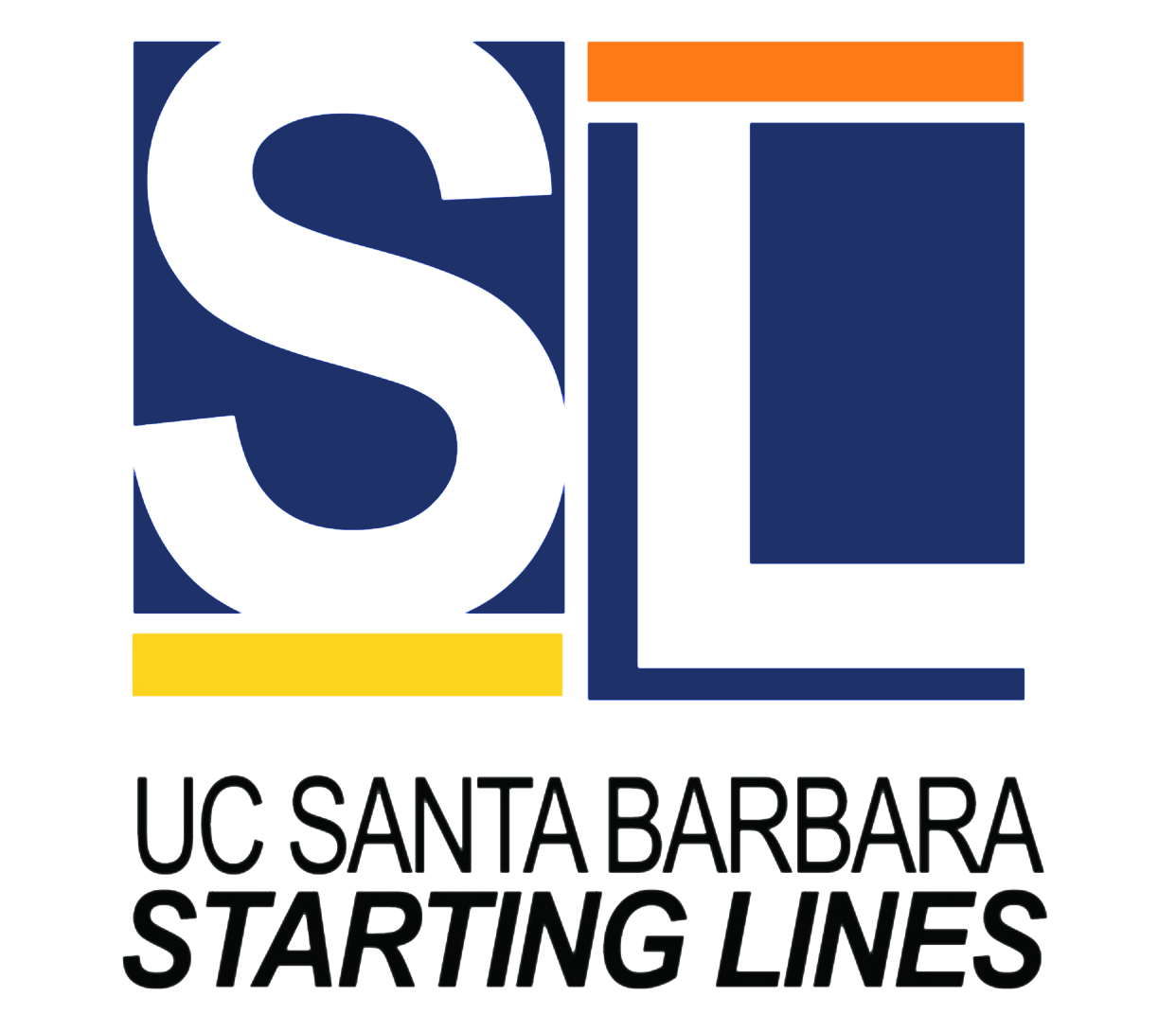Starting Lines is an anthology of student work published annually by the University of Santa Barbara Writing Program as a text and instructional tool for first-year writing classes: Writing 2, Writing 1, and Linguistics 12. For the last two years, we have partnered with Hayden McNeil to publish a new and improved version of Starting Lines.
Submissions of writing and campus photography are accepted throughout the year, and selections are made by faculty readers each spring. Prizes are awarded to contest winners in various categories, and all student authors receive certificates and a copy of the anthology. Student writers are also honored at an awards celebration at the end of spring quarter.
Starting Lines is available for purchase at the UCSB campus bookstore.
We are grateful for the work of other Writing Programs in developing models of successful publications of student writing: New Voices and Wings at California State University, Northridge; Student Writing Anthology, at the University of Massachusetts, Amherst; and Prized Writing at the University of California, Davis.
Significance
One way to help students gain expertise and place themselves in the world of other writers is to integrate opportunities for publication throughout their undergraduate education. Writing becomes real when it has an audience, and making the work of undergraduate students public for diverse audiences besides their instructors helps students to develop a new consciousness by enlarging their perception of audience, enhancing their motivation, improving their confidence, and most importantly, including them as insiders, as members of the circle of writers.
Student writers who come back to speak at the annual publication party talk about how being published has changed their perceptions of themselves, how writing has changed for them, and how much confidence they have gained. Students published in Starting Lines have gone on to complete the Writing Program’s Minor in Professional Writing and some have even interned on later issues. Their instructors report that Starting Lines authors have gone on to work on professional publications, have changed their majors to English and Public Relations, and have gone on to graduate schools in education and law.
Publishing Starting Lines has also offered several advantages for faculty. The anthology provides a powerful supplement in that it makes available a ready supply of writing samples that include the range of forms and styles that students are expected to produce. Writing and Linguistics faculty who participate on the Editorial Board screen the entries, an activity which has had the added benefit of creating a venue for discussing the desired qualities in student writing and the assignments that generated them. Ultimately the anthology has contributed to a larger ongoing conversation about pedagogy and instructional strategies.
"Publishing student writing is transformative because it tells a different story about who our students are, what they have experienced, what they think about, what they can do."
In addition to the more obvious instructional benefits, there are other more subtle effects. Publication can offer the kind of extrinsic motivation that encourages students to take their writing seriously. However, once engaged in such work, they may discover other more intrinsic rewards in reading and writing that will motivate them in the future. Experienced writers know that the prospect of publication cannot eliminate the discomforts or the labor involved in producing a polished piece of writing; however, it can make the work involved more worthwhile.
Besides seeing the work differently, students may come to see themselves in a new light. The autobiographies provided by the published writers suggest the variety and ability of students who take these courses. Students can read about peers from all over the world who have traveled to UCSB to pursue their education and consequently will be able to see themselves as part of a diverse and accomplished group.
Publishing student writing is transformative because it tells a different story about who our students are, what they have experienced, what they think about, what they can do. It tells this story not only for our students but also for instructors, by reminding us that our students’ work is more than a collection of errors. It demonstrates to our students and to the public that we value student thinking even as it is developing, and that their learning and their writing matters.
The students whose words fill the pages of Starting Lines offer us a glimpse of their development at the start of their academic lives. We see them discovering new ideas, making new realizations, and taking on new roles—and there is still so much more in store for them. Yet, Starting Lines is important for all students, not just for those whose work is published there. The anthology can establish a powerful legacy. As subsequent classes read and enjoy this work, the insights, inquiries, and stories of their predecessors may inspire them. Perhaps they will probe a little deeper when reading, or ask more provocative questions, and with any luck, they just may start some lines of their own.
